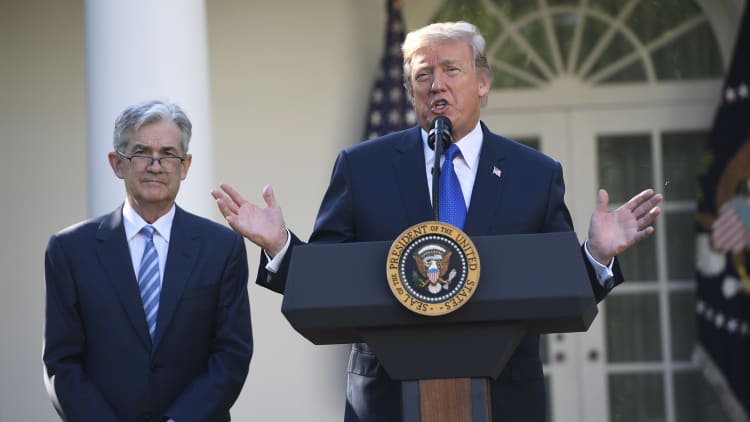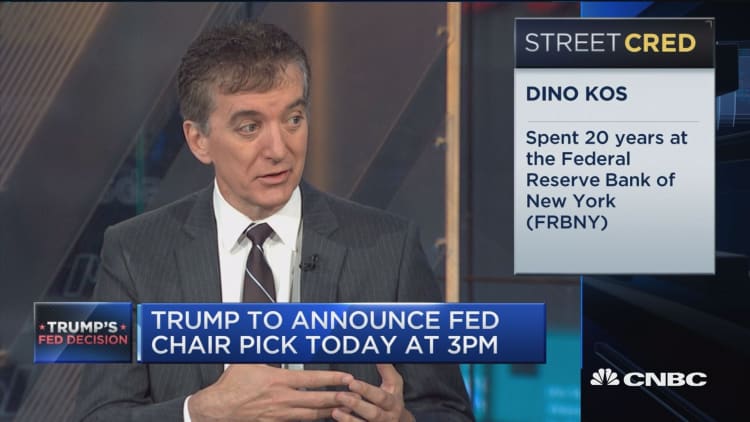
President Donald Trump nominated Jerome Powell to run the Federal Reserve once current Chair Janet Yellen's term expires, in a move widely expected and one unlikely to disturb the roaring stock market.
Trump made the announcement during a Thursday afternoon ceremony in the Rose Garden.
The move follows an extended period of speculation over who would be named to head the central bank, whose aggressive policies have been considered crucial to a climate of low interest rates, surging job creation and booming asset prices.
"Today is an important milestone on the path to restoring economic opportunity to the American people," Trump said with Powell standing to his right and the prospective chairman's family nearby. The president said the Fed requires "strong, sound and steady leadership" and Powell "will provide exactly that type of leadership."
"He's strong, he's committed and he's smart, and if he is confirmed by the Senate, Jay will put his considerable talents and experience to work leading our nation's independent central bank," Trump added.
Powell led a diverse field of potential nominees that included former Governor Kevin Warsh, Stanford economist John Taylor, chief Trump economic advisor Gary Cohn and Yellen herself.
Trump's relationship with Yellen has evolved; during the 2016 presidential campaign he said the Fed chief should be "ashamed" of the way she has run the Fed, arguing that Yellen kept policy loose for political reasons to boost the fortunes of former President Barack Obama.
Since taking office, though, his views have changed and he offered warm words for her Thursday despite deciding to replace Yellen and make her the briefest-serving Fed chair since G. William Miller from 1978-79.
Yellen's term has been marked by a mostly uninterrupted bull market run in stocks that began in March 2009 and low interest rates even as the Fed has sought to unwind the stimulus initiated during the crisis. The central bank has hiked its benchmark interest rate four times under Yellen and has taken the first steps in unwinding the $4.5 trillion balance sheet built up during the efforts to spur growth through bond purchases.
Yellen is "a wonderful woman who's done a terrific job," Trump said. "We have been working together for 10 months and she is absolutely a spectacular person. Janet, thank you very much. We appreciate it."
Though the Powell nomination was widely reported and anticipated for weeks, markets reacted positively to the announcement, with the Dow industrials tacking on about 60 points in the half-hour or so after Trump spoke.
"Jerome Powell is a smart choice for Fed chair," said Richard Clarida, global strategic advisor at bond giant Pimco. "He is likely to provide monetary policy continuity by adopting Yellen's framework of gradually normalizing rates and predictably reducing the Fed's balance sheet. He is also likely to be more receptive to calls for adjusting financial regulation prudently, especially for smaller banks."
Powell had been named to fill an unexpired term in 2012 that won't end until 2028. He is viewed as a convenient choice, someone who likely will continue the programs of the Yellen Fed but allow Trump a chance to put his own stamp on the central bank.
"I'm both honored and humbled by this opportunity to serve our great country," Powell said. "If I am confirmed by the Senate, I will do everything within my power to achieve our congressional assigned goals of stable prices and maximum employment."
The Fed is in the midst of normalizing the historically accommodative monetary policy it had begun to help pull the U.S. from the throes of the financial crisis and the Great Recession.
Under Yellen, the Fed has hiked interest rates four times and is expected to approve another increase in December. In addition, it is unwinding its balance sheet, which primarily consists of bonds the Fed purchased in an effort to drive down mortgage rates and push investors to risk assets like stocks and corporate bonds.
Powell has been part of the Fed's voting consensus since taking his seat, not once veering from the majority's position.
"I think the president has made a spectacular choice, and I'm really supportive of what the president is doing," Cohn told the Economic Club of Washington, D.C. earlier in the day.
But the move had some critics, primarily from those worried about Powell's academic background. Most Fed chairs have been Ph.D.s and have more background in economics than Powell, who has spent much of his career as a lawyer, in investment banking and at the Treasury under former President George H.W. Bush.
"Powell's resume is not up to the standards we would expect of a nominee for Fed Chair," Paul Ashworth, chief U.S. economist at forecasting firm Capital Economics, said in a note. "The risk of a serious policy mistake — in either direction — will arguably be higher under Powell's leadership than under Yellen's."
WATCH: Powell's nomination about 'continuity'



